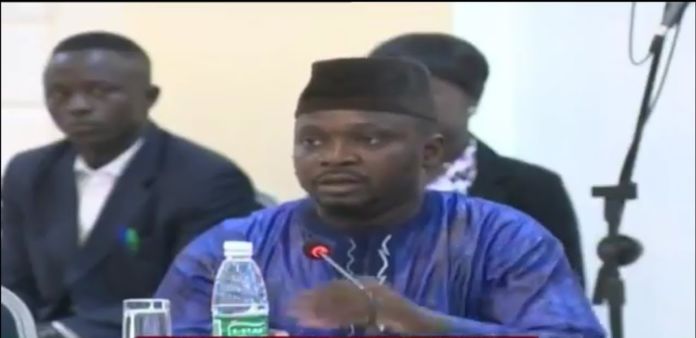By Yankuba Jallow
Ansumana Jammeh, a brother to former President Jammeh is challenging the jurisdiction of the Janneh Commission at the Gambia Court Appeal.
Mr. Jammeh is dissatisfied with the adverse findings of the Janneh Commission of Inquiry dated 29th March 2019 against him and thus filed an appeal before the Court of Appeal for determination. The former Gambia Ambassador to Qatar wants the Court of Appeal to issue an order setting aside the adverse findings made by the Commission of Inquiry against him.
The Attorney General has opposed the claim saying the relief sought is an attempt to delay the processes of executing the findings of the Commission. The State argued that the properties belong to the State via a high court judgment dated 13th June 2016. He is arguing that if the reliefs sought are granted, it will prejudice their case.
The State on the 12th May 2016 filed criminal charges against the appellant, a former Ambassador to Qatar. The criminal complaint alleged that the appellant engaged in a scheme to defraud the Government of the Gambia (GOTG) – the appellant is said to have assisted CONAPRO to get the contract to supply fuel to the Gambia and he (Mr. Saoud Ghandour) will make him (Ansumana Jammeh) happy. The criminal complaint further alleged that Mr. Jammeh used his position within the government to obtain information to assist CONAPRO to formulate a proposal for an oil supply contract, particularly in construction with “premium circulations”. Payment totalling over $1.5 million was paid from June 2010 to January 2011 to Ansumana Jammeh through one of his businesses, Maligam International Import and Export by Mr. Saoud Ghandour. Monies were subsequently withdrawn and spent on items including a Lexus RX3 vehicle for the benefit of Ansumana Jammeh.
Mr. Jammeh pleaded guilty to abuse of office, official corruption, receiving property to show favour, and conspiracy and economic crimes. A fine of D24,647,028 was imposed on him. In addition, his properties in Bijilo and Old Yundum as well as his vehicle worth D1,000,000 were forfeited to the State.
The Janneh Commission held that the judgment has not been executed adding that it must be executed by Sherriff of the High Court in accordance with the law.
On APAM, Ansumana Jammeh confirmed to the Janneh Commission that he was involved in the licensing of APAM and signed the license for APAM’s sand mining activities.
The Commission found that APAM for all intent and purpose was operating illegally because it was an illegal entity created by ex-President Jammeh to exploit and steal the country’s mineral resources and thereby clinch himself with impunity. The Commission held the former President and all the managers of APAM liable for the unlawful sand and mineral mining activities.
Ansumana Jammeh managed APAM from August 2015 to November 2015 and generated revenue of D10,268,000. He then paid D600,000 to KGI.
The Commission held that the sum of D600,000 paid to KGI by Ansumana Jammeh from APAM funds should be recovered at first instance from KGI and failing which it should be recovered from Ansumana Jammeh’s assets.
Aggrieved with the findings of the Janneh Commission, Jammeh is arguing that the Commission of Inquiry erred in law by acting in excess of its jurisdiction by looking into the CONAPRO and GFFI issues. According to the particulars, the appellant was convicted by a superior court of co-ordinate status and jurisdiction in respect of the same subject matter. The Commission was therefore estopped from inquiry and adjudicatory in respect of the same subject matter.
On the second ground of appeal, he claimed that the Commission violated section 24(1)(b) of the Constitution by making adverse findings against him in the absence of his testimony in respect of the CONAPRO and GFFI issue before the Commission. According to the particulars of the appeal, Jammeh said he was never asked about and no testimony was given under oath by him before the Commission in relation to the CONAPRO issue. He said the Commission merely relied on his witness statement provided to it by the police – the content of which was not examined in the testimony of the appellant before the Commission. He said the Commission denied him the fundamental right to a fair and impartial hearing as guaranteed by the Constitution.
On the third ground of appeal, Jammeh contended that the Commission erred both in law and in fact when it held that the appellant is liable to pay the sum of D600,000. According to the particulars, Jammeh said he was neither a director nor a shareholder in KGI and APAM, adding that he was merely acting as a manager of APAM and was simply acting on instruction as an employee. He said he is not liable under section 603 of the Companies Act 2013 and section 44 of the Single Window Business Registration Act 2013. He added that the liabilities of Toni Ghattas and Woreh Njie Ceesay could not be shifted onto him. He said the liabilities of APAM and KGI should be tied to their respective directors and or shareholders and not employees like the appellant.
On ground 4, Jammeh said the Commission erred in law in making an adverse order against him without making adverse findings against him in respect of APAM’s D600,000 payment to KGI. According to the particulars, he claimed that the Commission in its report held Toni Ghattas and Woreh Njie Ceesay jointly and severally liable and not the appellant, yet make adverse findings against him.
On the final ground of appeal, Jammeh said the adverse findings of the Commission against him are against the weight of evidence. According to the particulars, he is claiming that the evidence against him as a whole is weak and insufficient for the Commission to rely upon to make adverse findings against him.

















